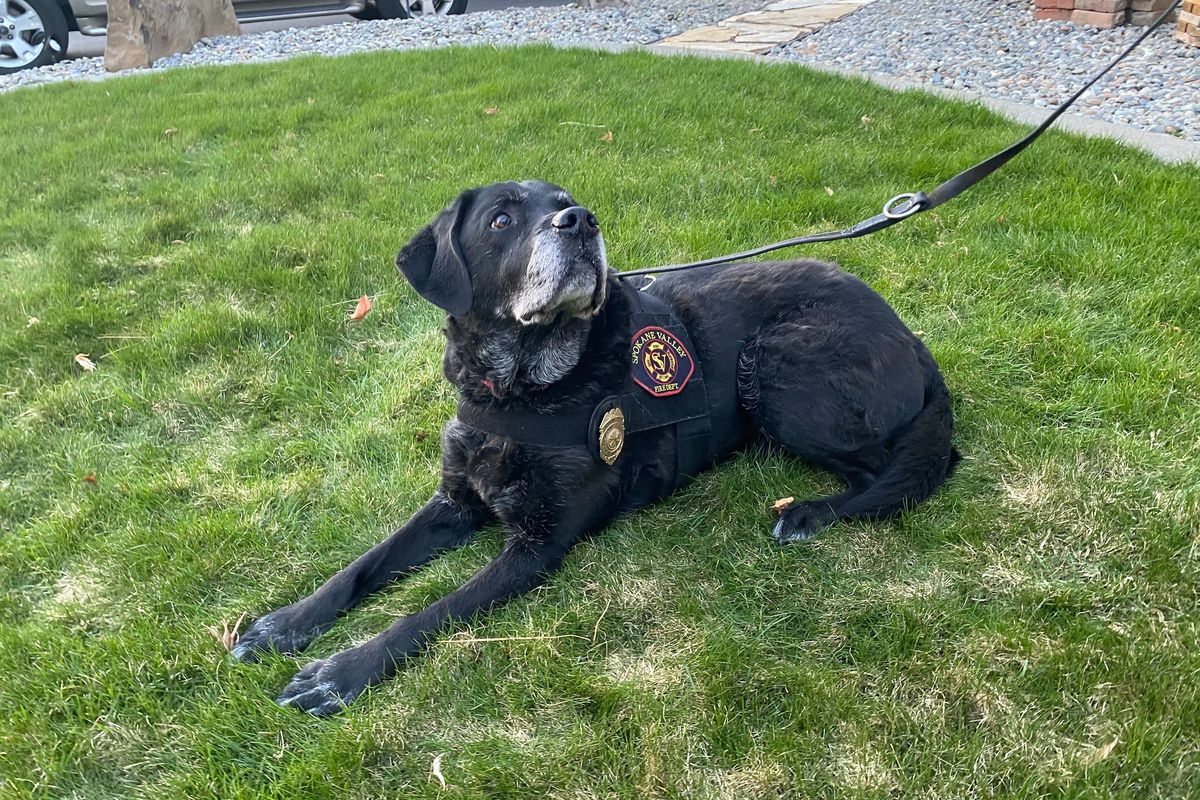‘Good dog’: Firefighting Labrador retriever Mako dies after prolific career in Spokane Valley
Tue., Dec. 27, 2022

Mako, a fire investigator with the Spokane Valley Fire Department, is seen in this April 2020 photo. Mako, who was almost 14, died earlier this month after a long career. (Courtesy of Rick Freier)
Mako the arson dog, who dedicated years of his life to investigating fires in the Northwest and worked even after he officially hung up his badge, died earlier this month. He was almost 14 years old.
For years, Mako was a fixture in the Spokane Valley Fire Department. The friendly black Lab wandered through offices in the department’s administration building, looking for pets and checking trash cans for food in between using his nose to sniff out accelerants at fire scenes from Spokane to Seattle.
He and handler Rick Freier, who was one of the department’s fire investigators at the time, also spent hours at middle schools around the district putting on science and fire safety classes. Mako was always a hit during these classes.
“I would use Mako as an example of how we collect data,” Freier said.
Mako arrived in Spokane Valley when he was a year-and-a-half old, paid for by State Farm Insurance. His nose could detect as little as 1/20th of a drop of gasoline, so he could make quick work of a fire scene. As the only arson dog in the region, he was frequently requested by other agencies to check out suspicious fires.
“Watching him work taught me where to look,” Freier said. “It made me a better investigator. I learned so much from him, I really did.”
Mako’s enthusiasm was easily seen in his work.
“He loved it,” Freier said. “It was a game for him every single time. He loved working.”
Mako retired in summer 2015 after five years on the job. At the time, Freier wanted to step down from investigative work and go back out on a fire truck so he could spend more time at home with his family. Working with Mako meant he was on call 24/7 and frequently traveled out of town for investigations.
Though Mako retired, the dog didn’t stop working. He and Freier went to middle schools every year for presentations on the scientific method.
“We still trained, not every day, just to keep him sharp for the kids,” Freier said.
Freier occasionally would get calls from fire departments and federal agencies that wanted Mako to check out a fire scene. Freier called it Mako’s “consulting phase.”
“I don’t know how many fires he worked after he retired,” Freier said. “They’d just call me. They had my number.”
Mako worked 187 fires during his official career, and Freier estimates that Mako worked five to 10 fires a year after he retired. The last fire Mako investigated was in Leavenworth in 2019. He stopped doing middle school visits in 2020, after appearing before 9,316 students.
Mako’s training method meant that he ate after he successfully sniffed an accelerant, whether it was during training or work. His retirement meant that he had to be retrained to eat from a bowl, which took time.
“If I put a bowl of food down, he wouldn’t eat it,” Freier said. “But if I wasn’t in the room and my wife put a bowl of food down, it would be gone.”
It took months before Mako would accept a bowl of food from Freier.
In recent years Mako had struggled with arthritis and hip problems. An anti-inflammatory pill let him run around like a puppy again at first, but over the years the dosage had to be increased several times. In the past few months, pain pills were added, and Freier began to think about whether Mako was getting too sick to enjoy life.
Then, one December day, Mako was in the backyard and his gums were cut by a piece of ice. The wound wouldn’t stop bleeding and he was rushed to the vet. It was determined that Mako had developed a clotting disorder and appeared to be in the early stages of liver failure.
Freier said he consulted with this family and the decision was made to put Mako down to end his suffering. Everyone got a chance to say goodbye, Freier said.
“He was a family dog almost as long as he was an arson dog,” he said.
Freier said he loved every moment of working with Mako.
“It was fun,” he said. “It was so much fun. Good dog.”
Local journalism is essential.
Give directly to The Spokesman-Review's Northwest Passages community forums series -- which helps to offset the costs of several reporter and editor positions at the newspaper -- by using the easy options below. Gifts processed in this system are not tax deductible, but are predominately used to help meet the local financial requirements needed to receive national matching-grant funds.
Subscribe now to get breaking news alerts in your email inbox
Get breaking news delivered to your inbox as it happens.
